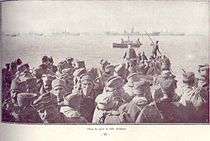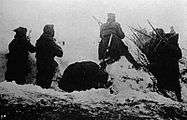Serbian army's retreat through Albania

Following the October of 1915 invasion of Serbia during World War I at the hands of German, Austro-Hungarian and Bulgarian armies, the Serbian army retreated through Albania, an event sometimes called the Albanian golgotha (Serbian: Албанска голгота). During the long march, some 240,000 retreating Serbs died from the cold, starvation, disease and at the hands of Albanian tribesmen.[1]
Background
The Balkan Wars

At the end of 1912, the Kingdom of Serbia occupied most of the Albanian-populated territory to the Adriatic coast. During the attempt to annex the lands, Serbian army committed serious crimes against the local Albanian population. In order to investigate the crimes, the Carnegie Endowment for International Peace formed a special commission, which was sent to the Balkans in 1913. Summing the situation in Albanian areas, the Commission concludes:
Houses and whole villages reduced to ashes, unarmed and innocent populations massacred en masse, incredible acts of violence, pillage and brutality of every kind — such were the means which were employed and are still being employed by the Serbo-Montenegrin soldiery, with a view to the entire transformation of the ethnic character of regions inhabited exclusively by Albanians.[2]
The Serbian government has denied reports on war crimes.[3] During the war, Serbian propaganda implemented a strong anti-Albanian campaign.[4] These events have greatly contributed to the enmity of the local population against the Serbian Army.[5]
The First World War
On 28 June 1914, Gavrilo Princip, a Bosnian Serb student and member of Young Bosnia, assassinated the heir to the Austro-Hungarian throne, Archduke Franz Ferdinand of Austria in Sarajevo, Bosnia.[6] The political objective of the assassination was to break the Austro-Hungarian's south-Slav provinces off from the Austro-Hungarian Empire. The assassination triggered a chain of events that embroiled Russia and the major European powers. This began a period of diplomatic manoeuvring among Austria-Hungary, Germany, Russia, France, and Britain called the July Crisis. Wanting to finally end Serbian interference in Bosnia and the Balkans, Austria-Hungary delivered the July Ultimatum to Serbia, a series of ten demands intentionally made unacceptable, intending to provoke a war with Serbia.[7] When Serbia agreed to only eight of the ten demands, Austria-Hungary declared war on 28 July 1914.
The dispute between Austria-Hungary and Serbia escalated into what is now known as World War I, which involved Russia, Germany, France, and the United Kingdom.
By December 1914, the Serbs had over 170,000 soldiers killed, wounded, diseased or missing. By this time, the Serbian army had managed to repulse three successive Austro-Hungarian invasions and Austro-Hungarian commander Marshal Oskar Potiorek was sacked. In early 1915, an enormous typhus outbreak started to wreak havoc across the country, during which some 150,000 people are estimated to have died during the worst typhus epidemic in world history.[8]
Retreat

On 7 October 1915, the Kingdom of Serbia was invaded by a combined German and Austro-Hungarian force. On 14 October, the Bulgarians declared war. With his forces vastly outnumbered and outgunned, Serb Vojvoda Marshal Radomir Putnik ordered a full retreat of the Serbian military south and west through Allied Montenegro and into neutral Albania on 25 November 1915. The weather was terrible, the roads were poor and the army had to help the tens of thousands of civilians who had retreated alongside the soldiers who had almost no supplies or food left. But the bad weather and poor roads worked for the Serbians as well, as the Germans and Bulgarians could not advance past the treacherous Albanian mountains, and so the thousands of Serbs who were fleeing their homeland managed to evade capture. However, hundreds of thousands of them were lost due to hunger, disease, thirst, hypothermia and because of attacks by enemy forces and Albanian tribal bands.[9]

The circumstances of the retreat were disastrous, and all told, some 155,000 Serbs, mostly soldiers, reached the coast of the Adriatic Sea, and embarked on Allied transport ships that carried the army to various Greek islands (many to Corfu) before being sent to Salonika.
Aftermath
During the retreat, approximately 200,000 Serbs perished in the Albanian mountains and thousands more perished once they arrived on the Greek island of Corfu. Because of the massive loss of life, the Serbian army's retreat through Albania is considered by Serbs to be one of the greatest tragedies in their nation's history.[10]
The survivors of the retreat were so weakened that thousands of them died from sheer exhaustion in the weeks after their rescue. While the main camps of the recuperating army were on the island of Corfu itself (a contingent was sent to Bizerte as well, and many of the civilian refugees were accepted by France), the sick and dying, mostly soldiers, were treated on Vido to prevent epidemics. In spite of Allied material help, the conditions of both the improvised medical facilities and many of the patients on the island resulted in a high fatality rate. Due to the small area of the island and because of its rocky soil, it soon became a necessity to bury the dead in the sea (by binding rocks to the corpses to prevent flotation). More than 5,000 Serbs were buried in such a manner[11] in what became known as the Blue Graveyard (Plava Grobnica), near the Greek island of Vido.
Commemoration

Serbian soldier Milutin Bojić wrote a poem called Plava Grobnica or Ode to a Blue Sea Tomb to commemorate his fallen comrades. Ultimately, Bojić himself succumbed to tuberculosis and was buried in the "Blue Graveyard", as well.
Films
Gde Cveta Limun Žut is a 2006 documentary film about the events that occurred.
Literature
Nikola B. Popović – "Srbi u Prvom svetskom ratu" (Serbs in the First World War) Rastko Petrović – "Sixth day" (Serbian: Dan šesti/Дан шести)
Music
- Kreće se lađa francuska – A World War I song that was written by Branislav Milosavljević on Corfu.[12]
- Tamo Daleko – A Serbian nostalgic-patriotic song.
Quotes
Only a few miserable remnants escaped into the Albanian mountains, losing the whole of their artillery and everything else that they could not carry. There was no longer a Serbian Army.
- Erich von Falkenhayn[13]
The relentless severity of the Bulgarian pursuit exposed the retreating Serbian forces and population to the worst horrors of war and winter. Scores of thousands of defenseless people perished.
- Winston S. Churchill, The Great War[14]
Images
- Serbian army's Retreat
-

Serbian soldiers in the winter of 1915
-

Serbian soldiers battling Albanian tribesmen
See also
References
- ↑ "Blic Online - Danas 93. godišnjica od početka povlačenja preko Albanije". Blic Online. Retrieved 13 September 2015.
- ↑ Report of the International Commission to Inquire into the Causes and Conduct of the Balkan War. Washington, D.C.: Carnegie Endowment for International Peace. 1914. Retrieved 2010-10-27.
- ↑ Dr. Robert Elsie. "1913 - Leo Freundlich: Albania's Golgotha: Indictment of the Exterminators of the Albanian People". Retrieved 13 September 2015.
- ↑ Dimitrije Tucović, Srbija i Arbanija (in Izabrani spisi, book II, pp. 56) Prosveta, Beograd, 1950.
- ↑ Dimitrije Tucović, Srbija i Arbanija (u Izabrani spisi, knjiga II, str. 117) Prosveta, Beograd, 1950.
- ↑ Willmott 2003, p. 26
- ↑ Willmott 2003, p. 27
- ↑ "$1,600,000 was raised for the Red Cross" (PDF). The New York Times. 29 October 1915.
- ↑ Tucker & Roberts 2005, pp. 1075–6
- ↑ Javna medijska ustanova Radio-televizija Vojvodine. "Početak povlačenja srpske vojske preko Albanije". Radio-televizija Vojvodine. Retrieved 13 September 2015.
- ↑ Administrator. "Ostrva Krf i Vido". Retrieved 13 September 2015.
- ↑ Branislav Milosavljević, Mač i lira [Sword and Lyre], Brod na Savi 1922, p. 128-129
- ↑ Jordan 2008, p. 50
- ↑ Jordan 2008, p. 58
Books
- Jordan, David (2008). The Balkans, Italy & Africa 1914–1918: From Sarajevo to the Piave and Lake Tanganyika. London, United Kingdom: Amber Books Ltd. ISBN 978-1-906626-14-3.